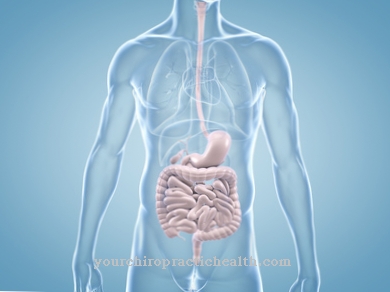Under Vertigo medical professionals understand a type of dizziness. Those affected often perceive it as a ride in a carousel, whereby a certain direction of the turning movement can be indicated. Spinning vertigo usually occurs spontaneously and can have different causes.
What is vertigo?

The term vertigo describes a form of vertigo. A distinction is made here between horizontal vertigo (those affected have the feeling as if they were driving in a carousel) and vertical vertigo (comparable to the feeling of an elevator going up or down).
This type of dizziness often occurs spontaneously, for example when the person concerned lies down or changes the position of their head while lying down. Spinning vertigo can last from a few seconds to several hours. On the other hand, a prolonged attack of vertigo over several days is very rare.
Like all forms of vertigo, vertigo is not an independent disease, but a symptom and can therefore have various causes. Not all of these causes have to be of disease character. For example, flights, carousel rides or unusual physical stress can lead to temporary vertigo.
causes
Spinning vertigo can be caused by various diseases or malfunctions. These include disturbances in the equilibrium center of the brain or a disease or inflammation of the inner ear, where the organ of equilibrium is located.
It is not uncommon for nerves or vessels to be damaged or inflamed and thus lead to poor signal transmission. The result is uncomfortable dizziness. Patients who frequently suffer from vertigo may also have cardiovascular diseases or metabolic diseases.
Psychological stress or excessive stress can also cause dizziness. In the case of vertigo, in particular, it should also be clarified whether there is an illness or injury in the neck and neck area.
You can find your medication here
➔ Medication for dizziness and circulatory problemsDiseases with this symptom
- Cardiovascular diseases
- Alcohol addiction
- Acoustic neuroma
- concussion
- Sunstroke
- Hypotension
- Anemia
- Circulatory disorders
- Metabolic disorder
- Inner ear infection
- Carotid stenosis
- Drug addiction
- high blood pressure
- Meningitis
- Meniere's disease
Diagnosis & course
Vertigo can usually be diagnosed by the attending physician on the basis of the patient's description. In the following examination, it is more important to find out the actual cause of the symptoms.
This requires an intensive discussion with the person concerned. Examinations of the ears can provide information as to whether the balance organ is affected. Additional blood tests provide information about any inflammation or infection in the body that could lead to dizziness. If damage to the brain is suspected, computed tomography is ordered.
The vertigo itself does not pose a threat to the organism. The respective cause, however, requires appropriate treatment, as otherwise it may pose a threat to the health or even life of the person concerned in the further course.
Complications
After a carousel ride, the vertigo goes away quickly because it is a normal reaction to the constant turns of the carousel ride. A permanent vertigo, however, is to be regarded as a possible indication of a serious illness. These include the organ of equilibrium, which is located behind the inner ear, the eyes for the sighted as a stabilizer of the body (posture) and proprioception (body perception). If there is a disorder in one of the senses, it can lead to vertigo as well as other functional disorders or diseases.
In the course of constantly recurring vertigo, nystagmus (jerky and involuntary eye movements) can occur. If a diagnosis and subsequent therapy are not made early on by the neurologist or in the dizziness clinic, the sense of balance can be permanently disturbed by impairment of the balance organ or the balance nerve. Damage to nerve tracts in the brain is also conceivable.
Serious complications are also to be feared in the form of worsening underlying diseases such as tinnitus, Menière's disease and inner ear damage. Neuralgia, brainstem syndromes and other brain diseases are also included and can spread from the cause to a complication if treatment is not given in time. It cannot be ruled out that an existing diabetic disease will worsen.
When should you go to the doctor?
As soon as you suddenly get dizzy after driving in the carousel or after changing from crouching to standing, this is an expected condition. Everything turns and sways. The causes lie in the sudden change of direction. In a healthy person, the triggering complaints are normally regulated after a short time by the circulatory system and the balance organ.
Spinning vertigo that lasts for a long time is not a normal symptom. It should therefore never be taken lightly. Accompanied by visual disturbances, nausea and vomiting, vertigo can also be a warning sign of other serious illnesses. In older patients, this can be a harbinger of an impending stroke.
The following reasons give reason to seek medical advice:
- Persistent vertigo with balance problems
- Attacks of dizziness from certain head movements
- sudden appearance without cause
- Vertigo during or after an infectious disease or flu-like illness
- recurring attacks after taking medication
- additional symptoms such as hearing problems, tiredness, fainting, shortness of breath, poor circulation or increased pulse, fever
- persistent vertigo after an accident or mechanical impact
Depending on the severity of the complaint, a doctor should be consulted in any case. It is advisable to go to the family doctor, as he has knowledge of the patient's health problems. In this way, the doctor can identify possible causes more quickly and make a suspected diagnosis. The involvement of other specialists is also required. In acute situations, however, the emergency doctor should be alerted immediately!
Doctors & therapists in your area
Treatment & Therapy
If vertigo only occurs in connection with severe physical or psychological stress or after a flight or a carousel ride, it generally does not require any medical treatment.
In these cases it is a temporary irritation that will subside by itself. If symptoms occur more frequently or if they persist over a longer period of time, appropriate therapy is necessary. The exact type of treatment depends on the individual cause. If the symptoms are caused by an infection, this can be treated with antibiotics.
Inflammation of the equilibrium nerve can in many cases be treated well with certain physiotherapy exercises. This also applies to complaints caused by problems in the throat and neck area. With the help of regular exercises, tensions can be released and the general sense of balance strengthened. Many patients experience a significant improvement in their health.
If the organ of equilibrium is damaged and cannot be restored, it can be surgically removed. Such interventions are rare, however, since vertigo can in most cases be cured without lengthy therapy.
Outlook & forecast
As a rule, vertigo is only a short-term symptom, which in many cases disappears on its own. The vertigo can be triggered by stress, a lack of fluids or an illness. However, the vertigo usually disappears once the disease has been combated.
If the vertigo is too strong, an emergency doctor must be called. In these cases it often happens that people lose consciousness, which can result in severe injuries. If the vertigo occurs during an activity, the activity must be interrupted immediately.
A doctor must be consulted if the vertigo occurs constantly and thus complicates everyday life. The treatment is usually carried out with medication; there are no surgical interventions. Treatment can fix the vertigo in most cases and does not lead to further complications or problems. Without treatment, stress, headaches, or other complications caused by vertigo can occur. Persistent vertigo can be a serious condition that definitely needs to be investigated by a doctor.
You can find your medication here
➔ Medication for dizziness and circulatory problemsprevention
Since vertigo usually occurs spontaneously and is not a disease itself, but only a symptom, prevention in the true sense cannot take place. If symptoms of vertigo, which may be accompanied by headaches and nausea, occur more frequently, a doctor should be consulted to clarify the causes of the vertigo.
You can do that yourself
Anyone who suffers from vertigo (in technical terms: Menière's disease) knows that this malaise is no triviality. The good news: Menière's disease is fully curable. How can you help yourself? Avoiding stress is a top priority. Bed rest is recommended, as is calm, deep breathing. The rule of thumb is: breathe in through your mouth for four seconds, breathe out for eight seconds and do so for five minutes. A glass of water or something sweet can also work, because liquids and sugar stimulate the circulation.However, if you have severe balance disorders (if you are threatened with fainting) you should avoid eating because of the risk of suffocation.
In the acute state, walking aids and suitable footwear are appropriate. It is very helpful for the sense of sight to fix a fixed reference point with the eyes. Targeted balance exercises and regular movements (such as dance or ball games) also strengthen the sense of balance. By putting the legs up, the blood flows freely back to the heart, which raises the blood pressure. In general, building up body tension in the form of stretching exercises on the hands, fingers and legs is an effective means of increasing blood pressure. To stimulate the head's energy channels, a five-minute circular finger massage of the crook of the thumb is a good option.
In the case of drug therapy (usually with the active ingredient betahistine), it should be considered whether drugs should be used to promote blood circulation and reduce anxiety.



























